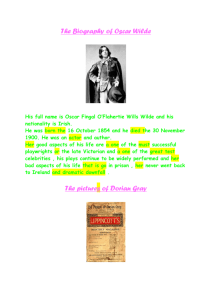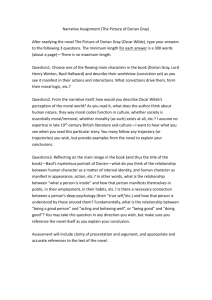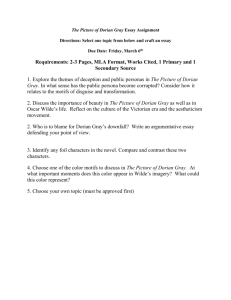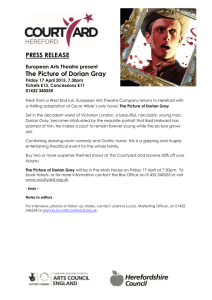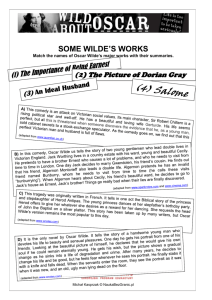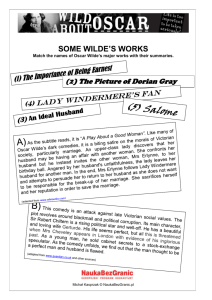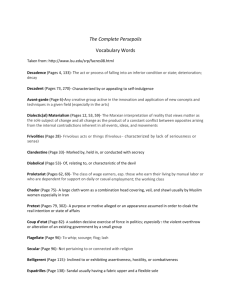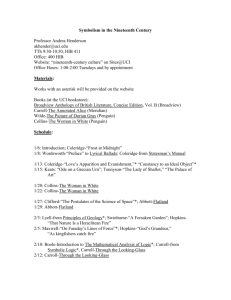File - mrspuertazdocs
advertisement
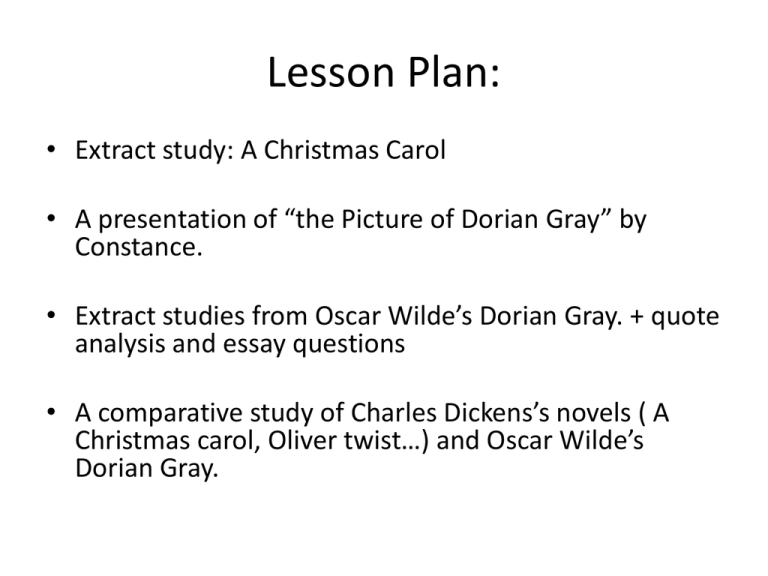
Lesson Plan: • Extract study: A Christmas Carol • A presentation of “the Picture of Dorian Gray” by Constance. • Extract studies from Oscar Wilde’s Dorian Gray. + quote analysis and essay questions • A comparative study of Charles Dickens’s novels ( A Christmas carol, Oliver twist…) and Oscar Wilde’s Dorian Gray. A Christmas Carol, Charles Dickens (1843) Chapter 1 – Marley’s ghost. […] Nobody ever stopped him in the street to say, with gladsome looks, ``My dear Scrooge, how are you. When will you come to see me.'' No beggars implored him to bestow a trifle, no children asked him what it was o'clock, no man or woman ever once in all his life inquired the way to such and such a place, of Scrooge. Even the blindmen's dogs appeared to know him; and when they saw him coming on, would tug their owners into doorways and up courts; and then would wag their tails as though they said, ``No eye at all is better than an evil eye, dark master! '' […] The cold became intense. In the main street, at the corner of the court, some labourers were repairing the gas-pipes, and had lighted a great fire in a brazier, round which a party of ragged men and boys were gathered: warming their hands and winking their eyes before the blaze in rapture. The water-plug being left in solitude, its overflowings sullenly congealed, and turned to misanthropic ice. The brightness of the shops where holly sprigs and berries crackled in the lamp-heat of the windows, made pale faces ruddy as they passed. Poulterers' and grocers' trades became a splendid joke: a glorious pageant, with which it was next to impossible to believe that such dull principles as bargain and sale had anything to do. The Lord Mayor, in the stronghold of the might Mansion House, gave orders to his fifty cooks and butlers to keep Christmas as a Lord Mayor's household should; and even the little tailor, whom he had fined five shillings on the previous Monday for being drunk and bloodthirsty in the streets, stirred up tomorrow's pudding in his garret, while his lean wife and the baby sallied out to buy the beef. Get in groups: Comparative analysis • With the help of your worksheet, analyze, compare and present extracts form the Victorian periods (Dickens v. Wilde). • You will also get a glimpse of the Gothic novel • Check those videos for more information: Videos online • http://www.biography.com/people/charles-dickens9274087 • http://www.biography.com/people/oscar-wilde9531078 • A brief synopsis for Dickens’ a Christmas Carol www.youtube.com/watch?v=kpMdSuguHrE A brief summary for The picture of Dorian Gray https://www.youtube.com/watch?v=s8iAuBdQJUg Essay questions on The Picture of Dorian Gray John William Waterhouse, Echo and Narcissus; 1903 Final Task • We are hosting a convention / conference on The Victorian Author, Oscar Wilde’s novel: The picture of Dorian Gray. • You will have to give a well-argued answer to an essay question, using the plot, quotes or extracts from the book, and your knowledge of the period and other writers. • You can also choose to comment on 2 quotes from the book, explain them and their impact thanks to your knowledge of the work and context. Assessment grid I have prepared my presentatio n seriously Yes! --4 So so--2 Not yet—0.5 I know the lesson thoroughly I have checked the pronunciati on of key / difficult words I do not make too many grammar mistakes I make myself clear by stressing the key words The Picture of Dorian Gray Essay Questions 1. In Oscar Wilde’s The Picture of Dorian Gray, the author alludes to the story of Narcissus, a young man in Greek mythology who, upon seeing his own image in a pool of water, fell in love with himself and died because he refused to be parted from his beloved. To what extent does the myth fit the story of the novel? Is Dorian Gray a modern Narcissus? Support your argument with details from the book. 2. Oscar Wilde’s The Picture of Dorian Gray alludes to the Faust legend, in which a man sells his soul to the devil in order to obtain what he desires, despite the fact that the devil does not actually appear in Wilde’s novel. In the various incarnations of the Faust story, that for which the protagonist sells his soul is indicative of the values of the age, or at least those of the author. For what is Dorian Gray willing to sell his soul? What does this tell you about the values of Oscar Wilde and his circle of friends, the so-called aesthetes? Describe those values using specific quotations from the novel and evaluate them on the basis of Scripture. 3. Oscar Wilde’s The Picture of Dorian Gray contains many epigrams, most of which are spoken by Lord Henry Wotton. Interestingly, a number of these epigrams reappear in the author’s bestknown play, The Importance of Being Earnest, which was written four years later. Choose three epigrams that appear in both works and analyze their contexts. In what ways does Wilde use these witty sayings differently? What do these differences indicate about the alteration in Wilde’s thinking in the period between the two works? 4. Oscar Wilde was one of the leading proponents of a school of thought known as Aestheticism, which argued that the sole purpose of art was beauty - that it needed no other justification, either moral or functional. Discuss the role played by this philosophy in his novel The Picture of Dorian Gray. In what ways are the ideas of Aestheticism expressed in the book? What role do they play in the plot? The Picture of Dorian Gray Quotes • “There is no such thing as a moral or an immoral book. Books are well written, or badly written. That is all.” (Oscar Wilde, preface) • “Every portrait that is painted with feeling is a portrait of the artist, not of the sitter. The sitter is merely the accident, the occasion. It is not he who is revealed by the painter; it is rather the painter who, on the colored canvas, reveals himself. The reason I will not exhibit this picture is that I am afraid that I have shown in it the secret of my own soul.” (Basil, ch.1, p.13) • “Conscience and cowardice are really the same thing, Basil. Conscience is the trade name of the firm. That is all.” (Henry, ch.1, p.14) • “It is only shallow people who do not judge by appearances.” (Henry, ch.2, p.29) • “How sad it is! I shall grow old and horrible and dreadful. But this picture will remain always young. It will never be older than this particular day of June. If it were only the other way! If it were I who was to be always young, and the picture that was to grow old! For that - for that - I would give everything! Yes, there is nothing in the whole world I would not give! I would give my soul for that!” (Dorian, ch.2, p.33) • “This portrait would be to him the most magical of mirrors. As it had revealed to him his own body, so it would reveal to him his own soul. And when winter came upon it, he would still be standing where spring trembles on the verge of summer. When the blood crept from its face, and left behind a pallid mask of chalk with leaden eyes, he would keep the glamour of boyhood. Not one blossom of his loveliness would ever fade. Not one pulse of his life would ever weaken. Like the gods of the Greeks, he would be strong, and fleet, and joyous. What did it matter what happened to the coloured image on the canvas? He would be safe. That was everything.” (ch.8, p.110-111) • “Beneath its purple pall, the face painted on the canvas could grow bestial, sodden, and unclean. What did it matter? No one could see it. He himself would not see it. Why should he watch the hideous corruption of his soul?” (Dorian’s thoughts, ch.10, p.126) • “The soul is a terrible reality. It can be bought and sold and bartered away. It can be poisoned or made perfect. There is a soul in each one of us. I know it.” (Dorian, ch.19, p.215) • “His beauty had been to him but a mask, his youth but a mockery.” (Dorian’s thoughts, ch.20, p.220)
